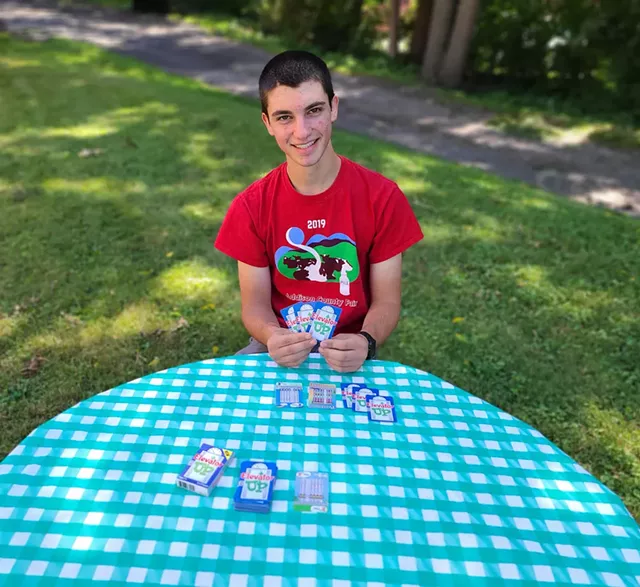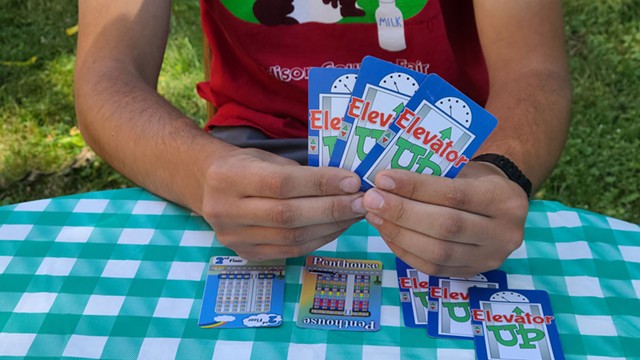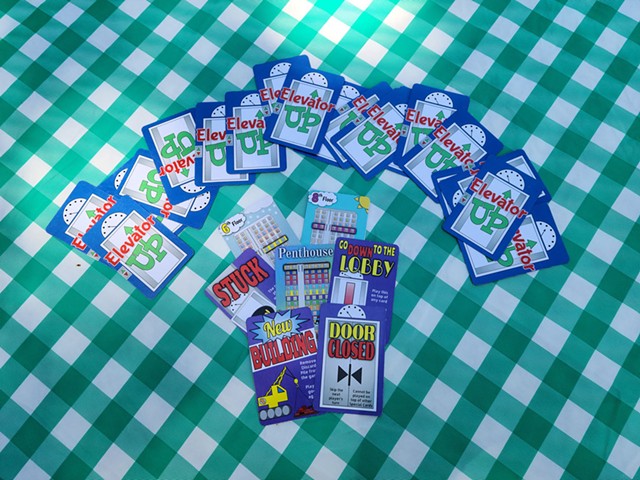Teen Harrison Brooks Invents New Card Game, ElevatorUp | Culture | Seven Days
Harrison Brooks has loved games for as long as he can remember. The 17-year-old high school senior grew up playing anything he could get his hands on, particularly card games such as UNO, Rat-a-Tat Cat, Go Fish, gin rummy and poker. Eventually, the industrious teen began making up games himself. So far, he’s gotten one off the ground.
Brooks conceived, designed and produced ElevatorUp. For two to five players, the game consists of a deck of 50 cards that takes participants on an unpredictable “elevator ride.” ElevatorUp is simple enough for elementary schoolers yet stimulating enough to keep adults engaged.
“I don’t know how I came up with the idea,” says Brooks, who meets a reporter to play the game sporting a cherry-red Addison County Fair & Field Days T-shirt, a calculator watch and a cap touting its origin in Lincoln, Vt. “It’s fun for all ages, but the design is definitely geared more toward younger kids.”
The slight, affable teen and his family are normally based in New York City, but they have strong ties to Lincoln, where Brooks’ grandmother has lived for 20 years. He and his family have spent many school holidays and vacations in the Addison County town, where they’ve been riding out the pandemic for the past few months. They plan to move to Vermont full time in the near future.
Brooks conceived of ElevatorUp using regular playing cards, taking elements of many games he liked and weaving them together with components of his own creation. But keeping track of the special properties he assigned to certain cards proved difficult, so Brooks made his own deck with paper. The elevator theme followed.
“[Elevators] work well with the game, [since it’s] all about going up in numbers,” he explains, noting that the theme also nods to his life growing up in the city.
In ElevatorUp, as in many card games, whoever gets rid of all of their cards first wins. Most of the deck is composed of cards that pair pictures of high-rise buildings with floor numbers. Players discard these in sequential order. If a player drops a third-floor card, for example, the next player must play a third floor or higher. If they can’t beat it, they draw a new card. As in UNO, once the whole play deck has been turned over into the discard pile, it’s shuffled and put in play again.
Selecting certain special cards disrupts game play. A card called “Door Closed” skips the next player’s turn; a “Lobby” card resets the sequence so that lower-floor cards can be played again.
Some additional cards are dealt at the beginning and reserved for the end of the game. Two are dealt face up and can be swapped out with cards from the player’s initial hand. Three others are dealt face down and must remain that way until a player runs out of cards in hand and picks them up. Since the player has no idea how useful these cards will be, the results can quickly turn the game around, and the uncertainty adds excitement.
Over the past couple of years, Brooks got serious about making his game a reality, he says. He developed graphic design skills and worked through several mockups, tweaking the designs until they evolved into colorful illustrations and an engaging typeface.
Brooks’ father, Andrew, offered guidance. “I helped him think about how his players would perceive the game and if the design would communicate what he wants it to communicate,” Andrew says.
The final piece of the process was getting the cards produced. After some research, Brooks landed on Hong Kong-based makeplayingcards.com. He found the company appealing because it doesn’t set a minimum on how many units can be produced per order.
Currently, ElevatorUp can be purchased for $9.99 from Amazon or his own site, but Brooks says he would love to see his game in brick-and-mortar shops.
Though he acknowledges that most kids his age might have different tastes, he favors tactile, interpersonal recreation.
“I’d say the majority of my generation, especially younger [kids], prefer games on their phones,” Brooks says. “Most of them are free, and you get them instantly. But I love to hold cards.
“I’ve played gin rummy and poker on my phone,” he continues, “but I still think there’s no comparison to holding cards in your hand.”
Brooks hopes that, if ElevatorUp takes off, people will adapt the game play with their own “house rules,” as often happens with mass-market games. But the structure he created is stimulating enough on its own.
“I think it can be played on a simple level or a more sophisticated level,” Andrew Brooks says of ElevatorUp. “It feels almost nostalgic. Pure, innocent family fun, without a screen or too much overthinking.”








